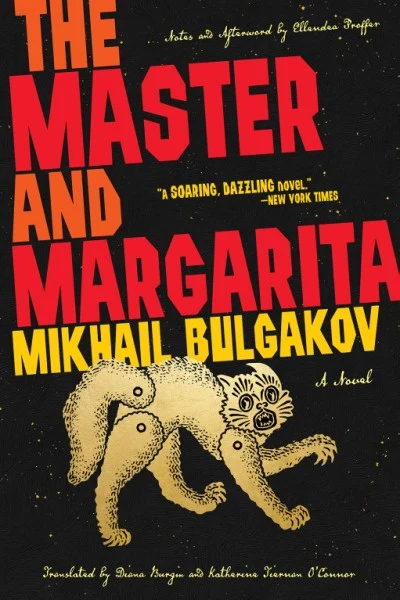Greetings dramacels and !bookworms 
As promised, today we are holding our first bookclub discussion thread. We’ll be discussing the first 7 chapters of “The Master and Margarita”, written by the late Russian author Mikhail Bulgakov, set in Stalinist Moscow  .
.
I hope you have enjoyed these first chapters, I certainly did. Based on the numbers of pages read from chapters 1-7, next week discussion will be about chapters 8-17.
I know it was supposed to be at noon E.T. However I’m posting a bit early because I’m off for a family lunch in half an hour, and I don’t want to longpost there.
Have fun with the discussion!





 . “The Master and Margarita” Chap. 1-7
. “The Master and Margarita” Chap. 1-7




Jump in the discussion.
No email address required.
Ill go chapter by chapter:
Chapter 1: does a good job showing the arrogance of the USSR's state established atheism and the general mood of the book which is very uncertain characters frequently hallucinating things or being unsure of what they are seeing.
Chapter 2: This chapter is incredible and could easily stand alone as a short story. I like how slightly less obvious names are used for biblical characters then standard translations which makes everything seem off. It also seems interesting to me that jesus is portrayed as a man physically unable to see evil while Pilate is a punisher of evil. Its an interesting dictamy.
This line stood out to me:
Chapter 3: mostly just continuing the same tone of 1 but I did not expect Berlioz to die that soon.
Chapter 4: seemed to mostly be a comedic chase which according to the notes here is a satire of some russian opera. Ivan takes a mock baptism in the Moscow river. Wonder if that will be important later minus the symbolism of the sacred and profane mixing (holy cleanliness vs dirty industrial river).
Chapter 5: again seemed mostly to be satirizing people and literary works from the time and I found it kinda boring. The weird pirate ship scene was spooky tho
Chapter 6: an excellent portrait of a party line creative. Really the last line says all you need to know about Ryukhin genius stuff:
Chapter 7: a pretty funny look at the stalinist era unpersonings. Now we really see Woland/Mephistopheles/Satan's entourage develop. Of note is that when Styopa is sent to heck at the end he wakes up near "Yalta" which I assume is referring to the Yalta conference where the allies discussed how to divvy up the axis powers. Perhaps some blame is being placed on the other Allies for allowing Stalinist russia to develop unchecked. Not only turning a blind eye to his human rights violations but actively promoting Stalin as an ally and man of the future, The man of steel.
Jump in the discussion.
No email address required.
Which version has notes?
Jump in the discussion.
No email address required.
Jump in the discussion.
No email address required.
Omg the pirated version also has it, the notes, they just aren't linked. But extremely interesting!
Jump in the discussion.
No email address required.
Darn good find
Jump in the discussion.
No email address required.
More options
Context
This version is also on the IA as a rental but it seems to be pretty accessible
Jump in the discussion.
No email address required.
Just in case, it's pirateable: https://libgen.is/fiction/819D3E8A110577E3C53018814ECAAACD
Jump in the discussion.
No email address required.
More options
Context
More options
Context
More options
Context
Does yours have notes inside the text or are they in the back
Jump in the discussion.
No email address required.
At the back
Jump in the discussion.
No email address required.
More options
Context
More options
Context
More options
Context
More options
Context
Good analysis
Another thing I liked is that it gives us a glimpse of the daily life in the Soviet Union under Stalin, which was an era were the USSR was almost closed to the outside world. They mention housekeepers in the book, I checked it and it turns out they were a thing the Soviet period, I didn’t know that.
Just a small detail, Bulgakov finished this book in 1939, and died in 1940, so the Yalta plot is unrelated to the Yalta Conference.
Jump in the discussion.
No email address required.
I guess maybe the joke is the devil sends him you heck and he still ends up in the ussr
Jump in the discussion.
No email address required.
Lmao, that would be a good joke.
Jump in the discussion.
No email address required.
More options
Context
More options
Context
I read a bit more than 7 chapters and the Soviet society part really starts to show. The bits about the housing associations/people rushing to get a newly freed up property the second someone dies (which is probably in short supply), some random person snitching on their neighbours and police just walking into an apartment (no warrant) over claims of foreign currency, etc.
Jump in the discussion.
No email address required.
Back in the 1930s housing was scarce, most people in Moscow and Leningrad lived in communal apartments. The so called “commie blocks” were built much later, in the 1950s/1960s during the Khrushchev era. Still, what a shithole, lmao. The MASSOLIT restaurant being closed to the general public was an interesting detail as well.
Jump in the discussion.
No email address required.
One thing I did like was how modern the Soviet asylum seemed to be (which again was probably >7). Commies did accomplish some progressive / modernist stuff. At least for people living in Moscow.
Jump in the discussion.
No email address required.
More options
Context
More options
Context
More options
Context
More options
Context
Your pulitzer's in the mail
Jump in the discussion.
No email address required.
More options
Context
More options
Context